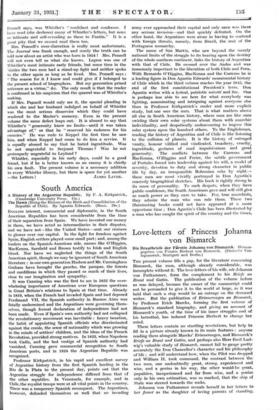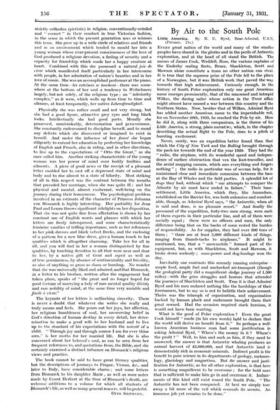Love-letters of Princess Johanna von Bismarck
THE present volume fills a gap, for the literature concerning Bismarck, the man, although already considerable, was incomplete without it. The love-letters of his wife, nee Johanna von Putkammer, form the complement to his Briefe an Braid and Gatlin. The publication of the volume before us was delayed, because the owner of the manuscript could not be persuaded to give it to the world at large, as it was held that such a step would be an outrage on the deceased writer.. But the publication of Erinnerungen an Bismarck, by Professor Erich Marcks, forming the first volume of Bismarck's standard biography, and giving an account of Bismarck's youth, of the time of his inner struggles and of his betrothal, has induced Princess Herbert to change her mind.
These letters contain no startling revelations, but help to fill in a picture already known in its main features : anyone reading them alongside Marcks' Erinnerungen, and Bismarck's Briefe an Braut and Gatlin, and perhaps also Herr Emil Lud- wig's valuable study of Bismarck, cannot fail to gauge pretty accurately the Iron Chancellor's character and his philosophy of life ; and will understand how, when the Pilot was dropped and William II. took command, the contrast between the two men, one undoubtedly great, strong, experienced and wise, and a genius in his way, the other would-be great, impulsive, inexperienced and far from wise, and a genius only in his own estimation, was so marked, that the ship of State was steered towards the rocks.
Johanna von Putkammer reveals herself in her letters to her fiance as the daughter of loving parents of standing, strictly orthodox (pietistic) in religion, conventionally-minded and correct " in their conduct in true Victorian fashion, in the sense in which the present generation uses or misuses this term. She grew up in a wide circle of relatives and friends and in an environment which tended to mould her into a young woman whose ever-present consciousness of the love of God produced a religious devotion, a feeling of security and a capacity for friendship which made her a happy creature at heart. Combined with this she possessed a natural joie de vivre which manifested itself particularly in her intercourse with people, in her admiration of nature's beauties and in her Jove of music. She was an accomplished performer at the piano. At the same time—les extremes se tcruclaent—there was some- where at the bottom of her soul a tendency to Weltschmerz largely, but not solely, of the religious type ; an " inferiority complex," as it were, which wells up from time to time and silences, at least temporarily, her native Lebensfreudigkeit.
Physically she was rather small and not very strong, but she had a good figure, attractive grey eyes and long black locks. Intellectually she had good parts. Morally she possessed, unmistakably, determination and perseverance. She constantly endeavoured to discipline herself, and to mend any defects which she discovered or imagined to exist in herself. And under the influence of her fiancé she began diligently to extend her education by perfecting her knowledge of English and French, also in riding, and in other directions, to live up to the expectations of " Otto the Great," as she once called him. Another striking characteristic of the young woman was her power of mind over bodily frailties and ailments. A piece of good news or the receipt of a pleasant letter enabled her to cast off a depressed state of mind and body and to rise almost to a state of hilarity. Most striking of all in this respect was the contrast between the months that preceded her marriage, when she was quite ill ; and her physical and mental, almost exuberant, well-being on the journey during their honeymoon. The psychological problem involved in an estimate of the character of Princess Johanna yon Bismarck is highly interesting. Her partiality for Jean Paul and Lenau throws significant sidelights on her disposition. That she was not quite free from affectation is shown by her constant use of English words and phrases with which her letters are freely interspersed, and some characteristically feminine vanities of trifling importance, such as her references to her pink dresses and black velvet frocks, and the enclosing of a pattern for a new blue dress, give a human touch to her qualities which is altogether charming. Take her for all in all, and you will find in her a woman distinguished by fine qualities, by touching devotion to all that were near and dear to her, by a native gift of Geist and esprit as well as of true genuineness, by absence of sentimentality and frivolity, as also of anything so gross as sham or humbug. No wonder that she was universally liked and admired, andthat Bismarck, in a letter to his brother, written after the engagement had taken place, speaks of " the great and no longer hoped for good fortune of marrying a lady of rare mental quality (Geist) and rare nobility of mind, at the same time very amiable and facile a vivre."
The keynote of her letters is unflinching sincerity. There is never a doubt that whatever she writes she really and truly means and feels. She pours out her joys, her affection, her religious humbleness of soul, her unswerving belief in God's direction of human destiny in every detail, her deter- mination to make a good wife to her husband and to live up to the standard of his expectations with the naiveté of a child. " Through joy and through sorrow I am for ever thine own," is her motto for her married life. But she is also concerned about her beloved's soul, as can be seen from her frequent references to, and quotations from, the Bible, and she certainly exercised a distinct influence on Bismarck's religious views and practice.
The book cannot be said to have great literary qualities, but the descriptions of journeys to Prague, Vienna, &c., and later to Italy, have considerable charm ; and some letters from Bismarck to his daughter Marie , as well as some notes made by Count Herbert at the time of Bismarck's death, are welcome additions to a volume for which all students of Bismarck's life, as well as many general reaaers, will be grateful.
01Y0 SIEPMANN.







































 Previous page
Previous page